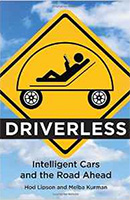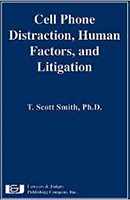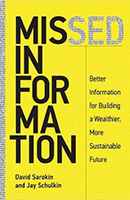 Verdict: It’s a Keeper
Verdict: It’s a Keeper
Driverless: Intelligent Cars and the Road Ahead
By Hod Lipson & Melba Kurman (Cambridge, MA: The MIT Press, 2016). 328 pgs. $29.95. Order, https://mitpress.mit.edu.
Reviewed by Douglas Bauman
Driverless cars have been appearing in science fiction movies for a while now. But the fiction is quickly becoming a reality as Google, Tesla, and other companies race to perfect the necessary technology. Anyone looking for an understanding of where we now stand and how we got here will find this book worthwhile.
Driverless is at its best when describing the technology used in today’s driverless-car prototypes and the evolution of that technology. Fortunately, that’s the bulk of the book. Except for some speculative discussions at the beginning and end, most of the book focuses on the hardware and software behind driverless cars and the surprisingly long history of their development (which the authors trace back to World War I). The descriptions of the technology are clear and give the impression that those are the subjects with which the authors feel most comfortable. (Author Hod Lipson is a professor of mechanical engineering at Columbia University. Author Melba Kurman is a technology writer.)
Want to Review a Book?
Please request a book and writing guidelines from Wisconsin Lawyer managing editor Karlé Lester, at klester@wisbar.org or (608) 250-6127. Reviewers may keep the book reviewed. Reviews of about 500 words are due within 45 days of receiving the book. Reviews are published, space permitting, in the order received and may be edited for length and clarity.
The speculative discussions that bookend the more substantive chapters contain the authors’ attempts to show where we might be headed. I found those discussions occasionally frustrating because they sometimes seem to rely on unwarranted assumptions. For instance, the authors posit that we will eventually have fleets of driverless-taxi pods, which will render both private car ownership and parking spaces obsolete – but taxis already exist, their numbers dwarfed by the number of privately owned cars, and even driverless pods will need to park somewhere eventually.
However, these speculative discussions also raise worthwhile issues, such as the social costs of driverless vehicles. For example, if parents have the option of sending their children to school or soccer practice in a driverless pod instead of doing the driving themselves, what happens to that opportunity for parents and children to interact?
One issue that is addressed only peripherally is how the law will deal with driverless cars. This is hardly surprising, considering that neither author is a lawyer. But legal issues are not entirely ignored; rather, they tend to be discussed in conjunction with economic or ethical issues. For instance, the authors speculate that, if driverless cars prove safe enough, consumers might pressure insurance companies to lower their premiums and states may repeal statutes that mandate insurance coverage. The authors also note that driverless vehicles would create new opportunities for crime, such as hacking a vehicle’s operating system or relying on the software’s safeguards against hitting pedestrians to force a vehicle to remain stopped while carjackers attempt to gain entry.
So, if you are looking for a book about the developing law of driverless vehicles, look elsewhere. But if you are looking for an introduction to the technology of these vehicles, this is a good place to start.
Douglas Bauman, U.W. 1998, is a court commissioner and staff attorney with the Marathon County Circuit Court, Wausau.
 Verdict: It’s a Keeper
Verdict: It’s a Keeper
Cell Phone Distraction, Human Factors, and Litigation
By T. Scott Smith (ed.) (Tucson, AZ: Lawyers & Judges Publishing Co., 2016). 464 pgs. $99. Order, www.lawyersandjudges.com.
Reviewed by Daniel Schmeeckle
Cell Phone Distraction, Human Factors, and Litigation, as the title implies, comprehensively covers the collective knowledge on the impact (mostly negative) of cell phones. Without a doubt, this book is more suitable as reference than a light read on a lazy afternoon. Given the pertinence of cell phone distraction in litigation, this book imparts a generalized knowledge of a broad topic. At 464 pages, the book shines in its in-depth coverage of the latest psychological, sociological, and biological research on effects of cell phone distraction.
At times, the authors have the tendency to become overly pedantic. For instance, the book’s treatment of the “Effects of Cell Phone Distraction on Geometric Planning with Applications to Collegiate Classroom” was a slog to get through. Clearly, the substance and applicability of that section were lost on me. On the other hand, the book is excellent at dissecting the hands-free debate and other more relevant topics. The authors compare the impact of driver distraction resulting from the use of a hand-held phone and a hands-free phone. On the practical side, the authors provide tips for choosing the correct expert and overcoming Daubert.
The book disappoints in its treatment of litigation. Strangely, the section addressing litigation and cell phone distraction focuses exclusively on two types of cases: 1) impaired employee performance cases, and 2) impaired parent cases. It is baffling that the editor chose these niche topics to the exclusion of a more universal topic such as litigating a distracted driving case. From a lawyer’s standpoint, the book would benefit from more practical tips on how to examine experts on cell phone distraction. Overall, however, the book merits inclusion in any litigation firm’s library.
Daniel Schmeeckle, Minnesota 2010, practices with Anderson, O’Brien, Bertz, Skrenes & Golla LLP, Stevens Point.
 Verdict: Not for Me, Maybe for You
Verdict: Not for Me, Maybe for You
Missed Information: Better Information for Building a Wealthier, More Sustainable Future
By David Sarokin & Jay Schulkin (Cambridge, MA: The MIT Press, 2016). 264 pgs. $29.99. Order, mitpress-orders@mit.edu.
Reviewed by Jennifer Herzog
Lawyers often are consumed by the concept of missed information. Whether you are a litigator agonizing over whether you have sufficiently reviewed discovery materials, a transactional attorney haunted by the specter of a missed detail that could tank an entire deal, or in another practice area, information is a potential tool and nightmare. In this context, Missed Information seems like the perfect read for any lawyer. The reality, however, is that the target audience for this book is unclear, and it certainly doesn’t seem to be you or me.
The focus of this book is how people acquire, manage, analyze, and use information. Embedded in those concepts are important reminders for lawyers regarding the methods through which information can be presented, manipulated, and even obfuscated. However, these thought-provoking concepts are mostly found in the book’s early pages and epilogue. The bulk of the book consists of examples (taken from the realms of healthcare, sustainability, and financial reporting, to name a few) of situations in which information could be better presented or acquired and suggestions for improving each system. These examples might be useful for policymakers but are generally too long-winded and specific to be of great use to the general public (even for the purpose of “starting a dialogue” as the authors hope), let alone lawyers. Ironically, the book ultimately suffers from exactly what it was meant to address: an excess of information obfuscating the underlying issues.
The greatest shortcoming of this book is that it is essentially comprised of uncited opinions. As a result, reading it almost feels like perusing a very long blog post. To that end, it would have been better suited as an article than a full book. This especially rings true when, after hundreds of pages of the authors generally positing their opinions, the epilogue states, “We don’t really believe everything we have written in this book.” Well, neither do I, and this ultimately raises the question of why one should read Missed Information in its entirety rather than some shorter pieces on this topic. The latter option will save you time and frustration.
Jennifer Herzog, Illinois 2005, is with the U.W.-Milwaukee Office of Legal Affairs, Milwaukee.
